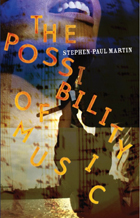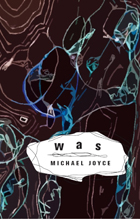
In these five surrealist collages, waking life continually gives way before the onslaught of dreams. Yuriy Tarnawsky has condensed the vastness of scope typical of novels into shorter fragments—mininovels—that require the reader’s active participation. The tone is a balance of dead-pan comedy and solemn gothic, sometimes a near-parody of wide-eyed candor, sometimes recounting utterly mad or barely conceivable states of affairs.
A candidate for major surgery struggles unsuccessfully to avoid it. Two strangers meet, and eventually marry, after participating in scream therapy. A pianist stops playing because he believes his hand is not there when he sits at the keyboard. A character sees the giant blue and white flowers he has craved his whole life only at the instance of his electrocution. Tyler Pavarotti, a tailor, voluntarily takes a role in a production in which he will be killed.
Tarnawsky’s language is elegant and careful, and his studied concentration of rhythm allows his work to transcend prose, nestling somewhere within the realm of musical composition. Both tragic and beautiful, in these stories life dissolves in time like blood in water.

The Possibility of Music is an imaginative reconstruction of America in the early 21st century. What would our post-9/11 society look like if it were viewed through a series of funhouse mirrors?
Each of Stephen-Paul Martin’s stories is a response to this question, a prose exploration that redefines what it means to write fiction in a world in which the Sistein Chapel has become the Mall of America. Nightmarish at times, playfully amusing at others, Martin’s prose is relentlessly inventive and challenging, relocating the experimental tradition of Joyce, Kafka, Borges, and Marquez in a contemporary context in which intelligent communication has become both impossible and increasingly necessary.
"I’d always told myself that if I ever wrote my own music," the narrator of one story says, "every composition would become its own distinct struggle with aesthetic questions that emerged as the process unfolded." In good part, that’s what animates The Possibility of Music, a book in which John Coltrane’s "Love Supreme" moves through characters and stories like a soundtrack.

Was is half-poem, half-narrative, a nomadic history whose main character is the fleetingness of information itself. The novel’s title figure, the word was, marks that instant of utterance outside the present; neither past nor future but rather the interstitial space of any telling. Like Ariel in flight, Was takes place before you can say ‘come’ and ‘go,'" slipping away before you can "breath twice and cry ‘so, so."
The nomadic lovers here, as any lovers, attempt to linger in the afterglow of what was, but it slips away like mist. Story begets story as if without author, events gathering into one another, as much memory as dream, their locales literally moving across the face of the globe. Continent to continent, from hemisphere to hemisphere, synaptic episodes strobe across the earth’s surface like thunderstorms seen from a satellite. Yet in these brief flashes a memorable and deeply moving procession of characters passes in vignette: lovers and children, parents and refugees, sailors, missionaries, clowns, mourners, forlorn warriors, sweet singers.
Was is a brilliant new work by the author of afternoon, a story which the New York Times calls "the granddaddy of hypertext fictions"and the Toronto Globe and Mail describes as being "to the hypertext interactive novel what the Gutenberg bible is to publishing."
READERS
Browse our collection.
PUBLISHERS
See BiblioVault's publisher services.
STUDENT SERVICES
Files for college accessibility offices.
UChicago Accessibility Resources
home | accessibility | search | about | contact us
BiblioVault ® 2001 - 2024
The University of Chicago Press









